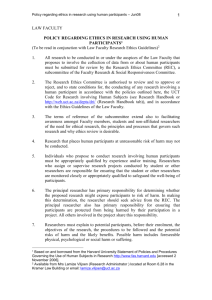SPRU generic text to help researchers [DOCX
advertisement
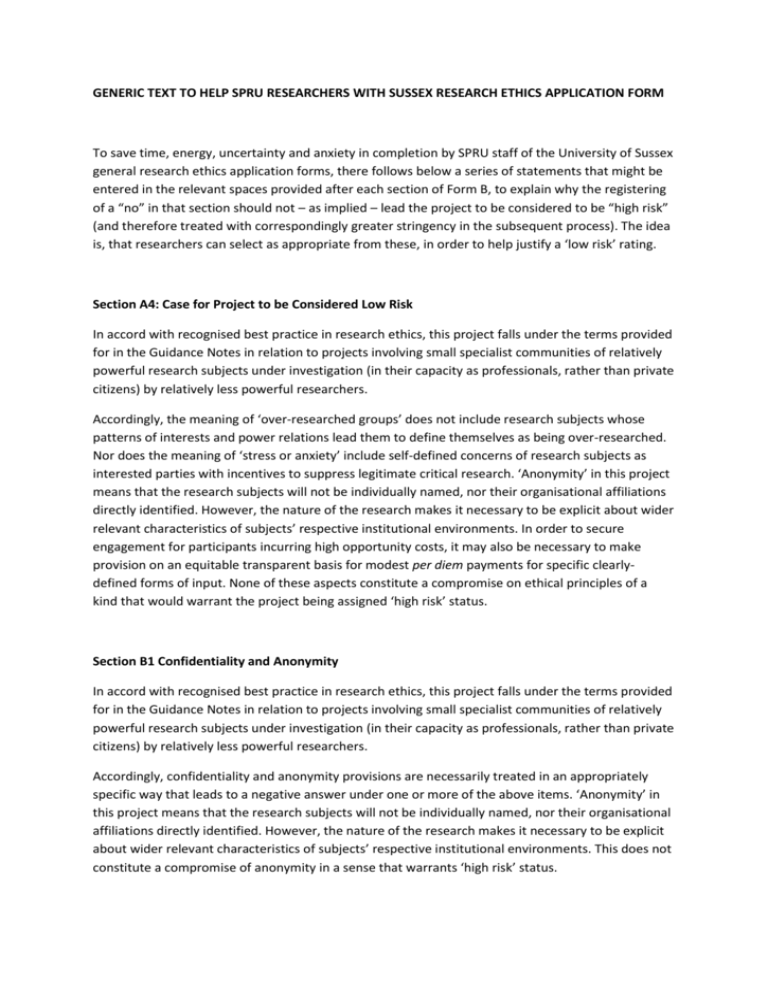
GENERIC TEXT TO HELP SPRU RESEARCHERS WITH SUSSEX RESEARCH ETHICS APPLICATION FORM To save time, energy, uncertainty and anxiety in completion by SPRU staff of the University of Sussex general research ethics application forms, there follows below a series of statements that might be entered in the relevant spaces provided after each section of Form B, to explain why the registering of a “no” in that section should not – as implied – lead the project to be considered to be “high risk” (and therefore treated with correspondingly greater stringency in the subsequent process). The idea is, that researchers can select as appropriate from these, in order to help justify a ‘low risk’ rating. Section A4: Case for Project to be Considered Low Risk In accord with recognised best practice in research ethics, this project falls under the terms provided for in the Guidance Notes in relation to projects involving small specialist communities of relatively powerful research subjects under investigation (in their capacity as professionals, rather than private citizens) by relatively less powerful researchers. Accordingly, the meaning of ‘over-researched groups’ does not include research subjects whose patterns of interests and power relations lead them to define themselves as being over-researched. Nor does the meaning of ‘stress or anxiety’ include self-defined concerns of research subjects as interested parties with incentives to suppress legitimate critical research. ‘Anonymity’ in this project means that the research subjects will not be individually named, nor their organisational affiliations directly identified. However, the nature of the research makes it necessary to be explicit about wider relevant characteristics of subjects’ respective institutional environments. In order to secure engagement for participants incurring high opportunity costs, it may also be necessary to make provision on an equitable transparent basis for modest per diem payments for specific clearlydefined forms of input. None of these aspects constitute a compromise on ethical principles of a kind that would warrant the project being assigned ‘high risk’ status. Section B1 Confidentiality and Anonymity In accord with recognised best practice in research ethics, this project falls under the terms provided for in the Guidance Notes in relation to projects involving small specialist communities of relatively powerful research subjects under investigation (in their capacity as professionals, rather than private citizens) by relatively less powerful researchers. Accordingly, confidentiality and anonymity provisions are necessarily treated in an appropriately specific way that leads to a negative answer under one or more of the above items. ‘Anonymity’ in this project means that the research subjects will not be individually named, nor their organisational affiliations directly identified. However, the nature of the research makes it necessary to be explicit about wider relevant characteristics of subjects’ respective institutional environments. This does not constitute a compromise of anonymity in a sense that warrants ‘high risk’ status. Section B2 Informed Consent and Recruitment of Participants In accord with recognised best practice in research ethics, this project falls under the terms provided for in the Guidance Notes in relation to projects involving small specialist communities of relatively powerful research subjects under investigation (in their capacity as professionals, rather than private citizens) by relatively less powerful researchers. Accordingly, informed consent and recruitment provisions are necessarily treated in an appropriately specific way that leads to a negative answer under one or more of the above items. Given the importance that research subjects acquire a full knowledge of the research before deciding on the exact terms for consent, the latter may not be agreed in detail until a later stage in the project, but prior to any publication or external report. In order to resist incentives to condition research findings, respondents’ right to withdraw at any time will not include the right to remove all associated data.
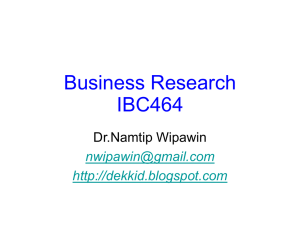
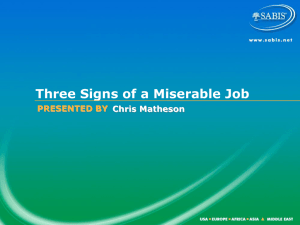
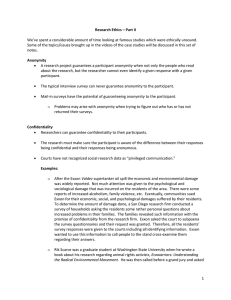
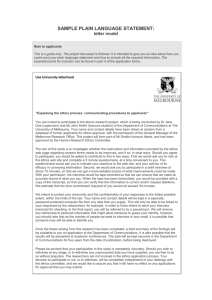
![Janet Boddy, Reader in Child, Youth and Family Studies, School of Education and Social Work [slides only]](http://s2.studylib.net/store/data/015029329_1-c4db5e91e79f69d3024b8f848185d0ef-300x300.png)
